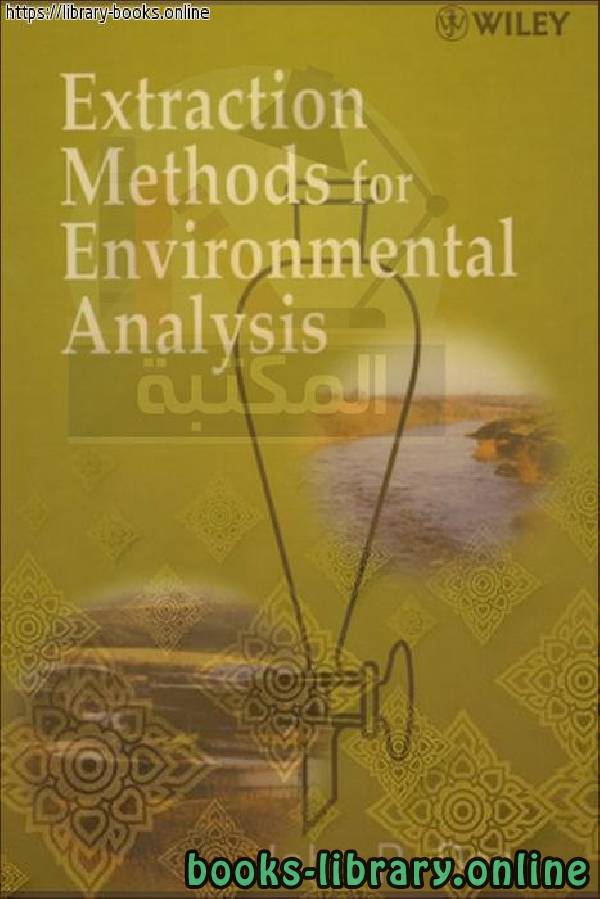كتاب Extraction Methods for Environmental Analysis
بذه عن الكتاب: Two common approaches are possible. In the first approach the extraction is carried out discontinuously where equilibrium is established between two immiscible phases, or the second approach, continuous extraction. In the case of the latter, equilibrium may not be reached. The selectivity and efficiency of the extraction process is critically governed by the choice of the two immiscible solvents. Using aqueous and organic (e.g. dichloromethane, chloroform, ethylene acetate, toluene, etc.) solvent pairs of solvents, the more hydrophobic analytes prefer the organic solvent while the more hydrophilic compounds prefer the aqueous phase. The more desirable approach is quite often reflected in the nature of the target analyte. For example if the method of separation to be used is reversed-phase high performance liquid chromatography (HPLC), then the target analyte is best isolated in the aqueous phase. In this situation the target analyte can then be injected directly into the HPLC system. (Note: The target analyte may well require preconcentration, e.g. solid phase extraction (see Chapter 4), to achieve the appropriate level of sensitivity.) In contrast, if the target analyte is to be analysed by gas chromatography it is best isolated in the organic solvent. In addition, isolation of the target analyte in the organic phase allows solvent evaporation to be employed (see Section 3.1.3) thus allowing concentration of the target analyte. The equilibrium process can be influenced by several factors that include adjustment of pH to prevent ionisation of acids or bases, by formation of ion-pairs with ionisable analytes, by formation of hydrophobic complexes with metal ions, or by adding neutral salts to the aqueous phase to reduce the solubility of the analyte (salting out).JOHN R. DEAN - ❰ له مجموعة من الإنجازات والمؤلفات أبرزها ❞ Extraction Methods for Environmental Analysis ❝ ❱
من Biology Books علم الأحياء - مكتبة الكتب العلمية.

قراءة كتاب Extraction Methods for Environmental Analysis أونلاين
معلومات عن كتاب Extraction Methods for Environmental Analysis:
Two common approaches are possible. In the first approach the extraction is carried out discontinuously
where equilibrium is established between two immiscible phases, or the second approach, continuous
extraction. In the case of the latter, equilibrium may not be reached. The selectivity and efficiency of
the extraction process is critically governed by the choice of the two immiscible solvents. Using
aqueous and organic (e.g. dichloromethane, chloroform, ethylene acetate, toluene, etc.) solvent pairs of
solvents, the more hydrophobic analytes prefer the organic solvent while the more hydrophilic
compounds prefer the aqueous phase. The more desirable approach is quite often reflected in the nature
of the target analyte. For example if the method of separation to be used is reversed-phase high
performance liquid chromatography (HPLC), then the target analyte is best isolated in the aqueous
phase. In this situation the target analyte can then be injected directly into the HPLC system. (Note: The
target analyte may well require preconcentration, e.g. solid phase extraction (see Chapter 4), to achieve
the appropriate level of sensitivity.) In contrast, if the target analyte is to be analysed by gas
chromatography it is best isolated in the organic solvent. In addition, isolation of the target analyte in
the organic phase allows solvent evaporation to be employed (see Section 3.1.3) thus allowing
concentration of the target analyte.
The equilibrium process can be influenced by several factors that include adjustment of pH to prevent
ionisation of acids or bases, by formation of ion-pairs with ionisable analytes, by formation of
hydrophobic complexes with metal ions, or by adding neutral salts to the aqueous phase to reduce the
solubility of the analyte (salting out).
سنة النشر : 1998م / 1419هـ .
عدد مرات التحميل : 3997 مرّة / مرات.
تم اضافته في : الثلاثاء , 25 فبراير 2020م.
حجم الكتاب عند التحميل : 3.43 .
تعليقات ومناقشات حول الكتاب:
Biologically
Biology is a natural science that is concerned with the study of life, its various forms and its function, how these organisms interact with each other and with the surrounding environment. The word biology in Greek is made up of two words: bio (βίος) meaning life. And loggia (-λογία) means science or study. Biology: the similarity of vegetation and animal cover on the edges of the African and American states, and the existence of the same fossil.
Branches of biology
Biology is an ancient science thousands of years old and modern biology began in the nineteenth century. This science has multiple branches. Among them are:
Anatomy
Botany
Biochemia
Biogeography
Biofisia
Cytology or cell science
Ecology or environmental science
بذه عن الكتاب:
Two common approaches are possible. In the first approach the extraction is carried out discontinuously
where equilibrium is established between two immiscible phases, or the second approach, continuous
extraction. In the case of the latter, equilibrium may not be reached. The selectivity and efficiency of
the extraction process is critically governed by the choice of the two immiscible solvents. Using
aqueous and organic (e.g. dichloromethane, chloroform, ethylene acetate, toluene, etc.) solvent pairs of
solvents, the more hydrophobic analytes prefer the organic solvent while the more hydrophilic
compounds prefer the aqueous phase. The more desirable approach is quite often reflected in the nature
of the target analyte. For example if the method of separation to be used is reversed-phase high
performance liquid chromatography (HPLC), then the target analyte is best isolated in the aqueous
phase. In this situation the target analyte can then be injected directly into the HPLC system. (Note: The
target analyte may well require preconcentration, e.g. solid phase extraction (see Chapter 4), to achieve
the appropriate level of sensitivity.) In contrast, if the target analyte is to be analysed by gas
chromatography it is best isolated in the organic solvent. In addition, isolation of the target analyte in
the organic phase allows solvent evaporation to be employed (see Section 3.1.3) thus allowing
concentration of the target analyte.
The equilibrium process can be influenced by several factors that include adjustment of pH to prevent
ionisation of acids or bases, by formation of ion-pairs with ionisable analytes, by formation of
hydrophobic complexes with metal ions, or by adding neutral salts to the aqueous phase to reduce the
solubility of the analyte (salting out).
Biology
Human biology
Who is the founder of biology?
The importance of biology
Areas of work in the field of biology
Theories of biology
Research on biology for the first grade of secondary school
Human biology
 مهلاً !
مهلاً !قبل تحميل الكتاب .. يجب ان يتوفر لديكم برنامج تشغيل وقراءة ملفات pdf
يمكن تحميلة من هنا 'تحميل البرنامج'

نوع الكتاب : pdf.
اذا اعجبك الكتاب فضلاً اضغط على أعجبني و يمكنك تحميله من هنا:


كتب اخرى في Biology Books
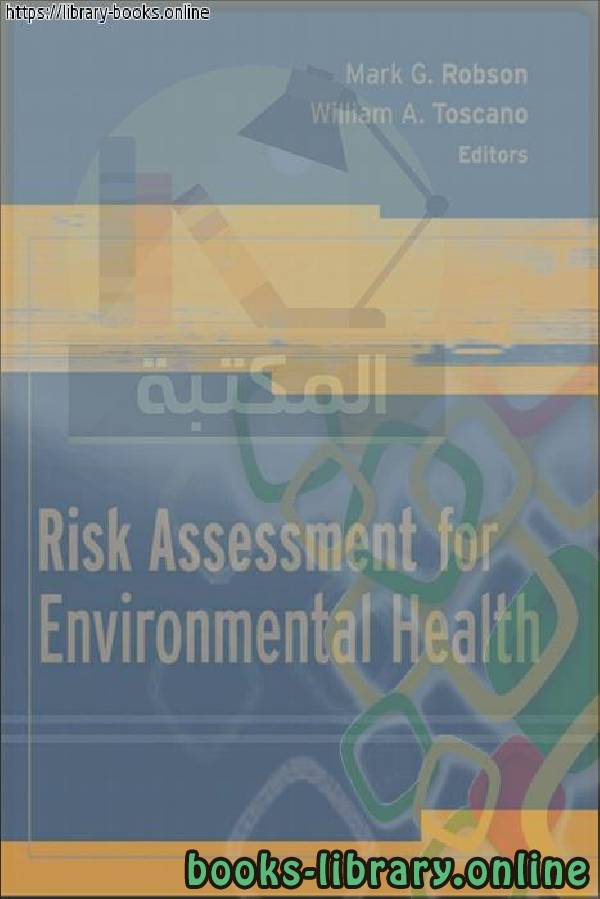
Public Health_Environmental Health Risk Assessment for Environmental Health PDF
قراءة و تحميل كتاب Public Health_Environmental Health Risk Assessment for Environmental Health PDF مجانا
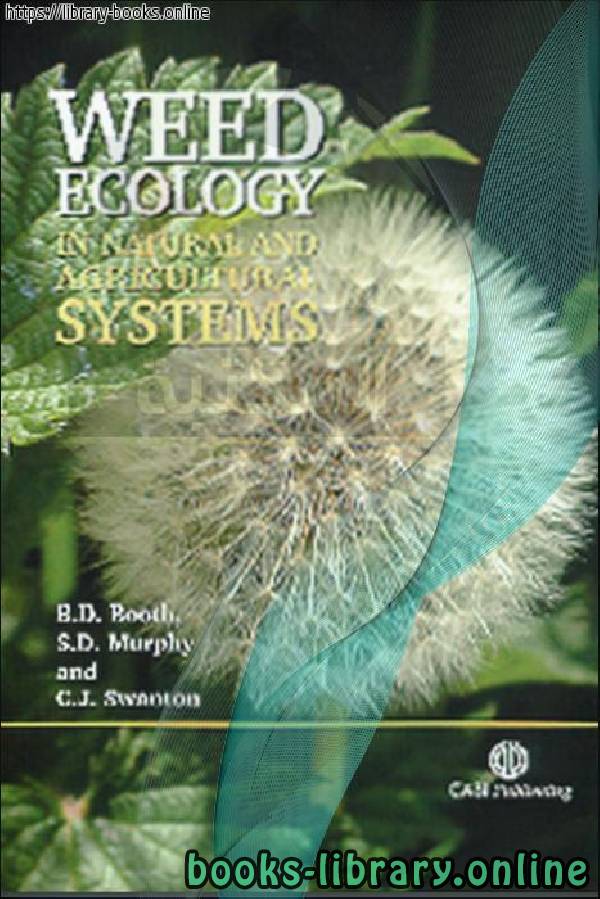
Weed Ecology in Natural and Agricultural Systems PDF
قراءة و تحميل كتاب Weed Ecology in Natural and Agricultural Systems PDF مجانا
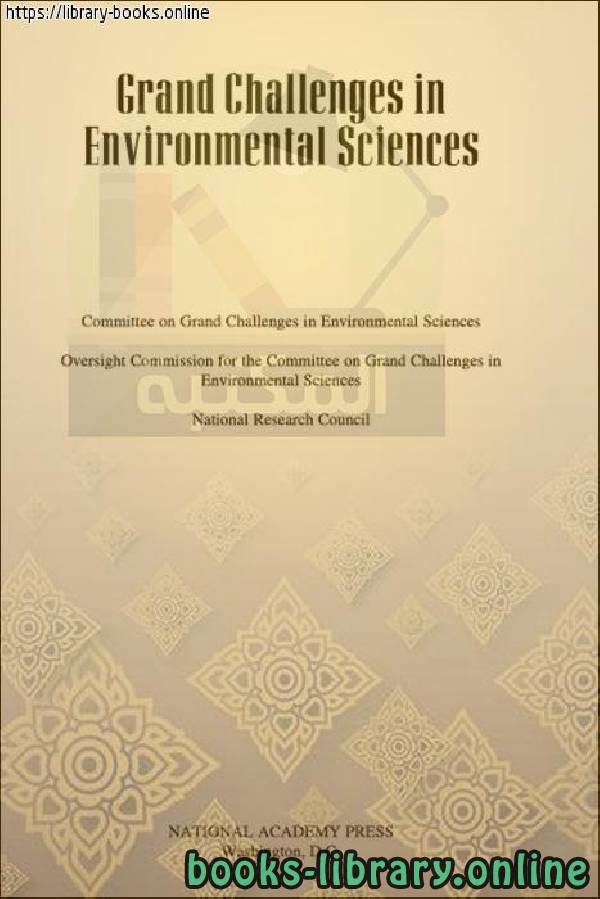
Grand Challenges in Environmental Sciences National Academy PDF
قراءة و تحميل كتاب Grand Challenges in Environmental Sciences National Academy PDF مجانا

Discovering Evolutionary Ecology Bringing Together Ecology and Evolution PDF
قراءة و تحميل كتاب Discovering Evolutionary Ecology Bringing Together Ecology and Evolution PDF مجانا
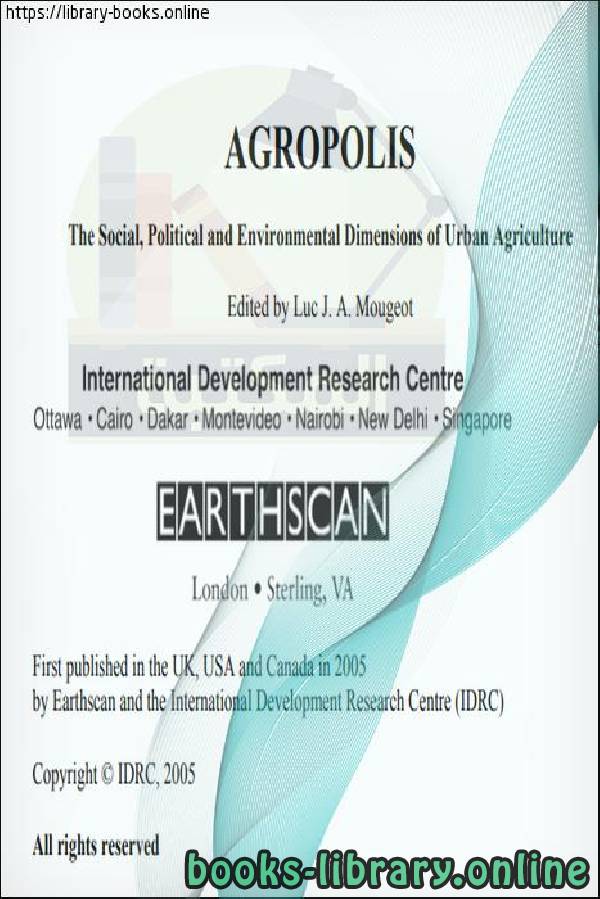
Analytical Techniques in the Sciences AnTs PDF
قراءة و تحميل كتاب Analytical Techniques in the Sciences AnTs PDF مجانا

Developments in environmental modelling PDF
قراءة و تحميل كتاب Developments in environmental modelling PDF مجانا
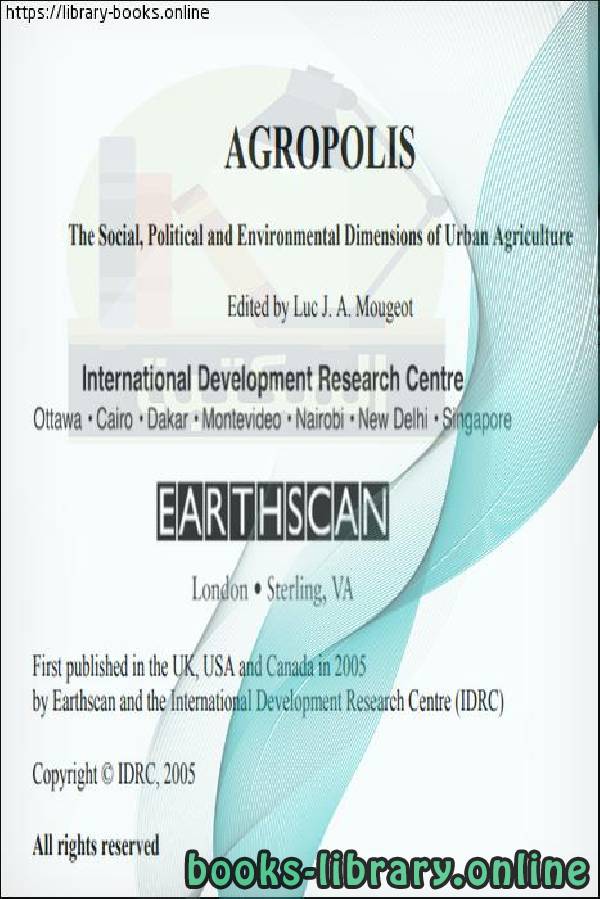
The Social, Political and Environmental Dimensions of Urban Agriculture PDF
قراءة و تحميل كتاب The Social, Political and Environmental Dimensions of Urban Agriculture PDF مجانا
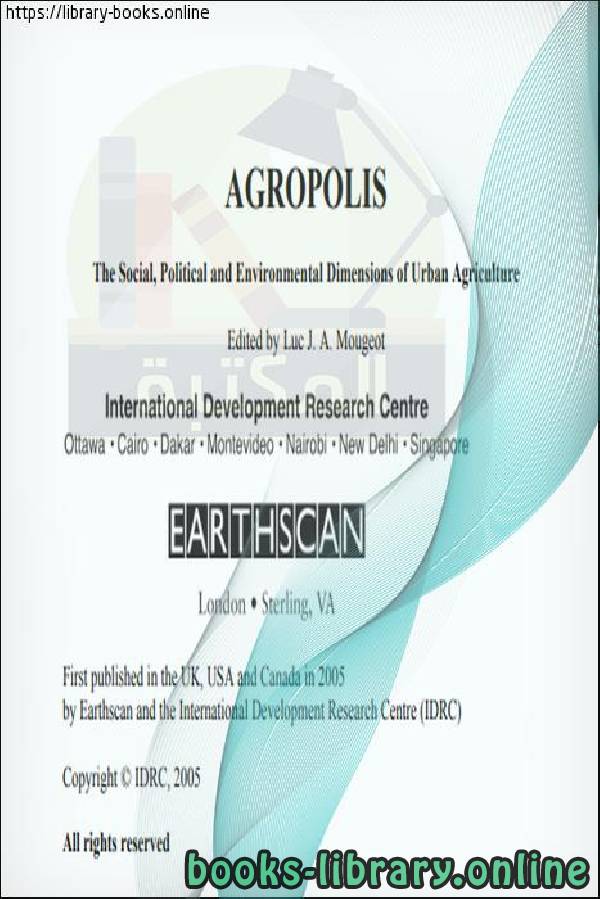
The Social, Political and Environmental Dimensions of Urban Agriculture PDF
قراءة و تحميل كتاب The Social, Political and Environmental Dimensions of Urban Agriculture PDF مجانا
